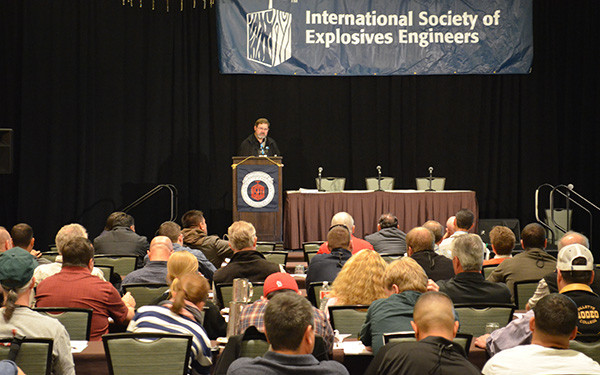Learn what makes a great blast design and get updates from the best in the business. The Blasters Training Seminar is included in the Blasters Weekend Package. It's also offered as a separate sign up for those who can't make the full Blasters Weekend.
This popular and highly regarded one day seminar will take place on Saturday, Feb. 8. It was designed and presented for blasters by the best in the business to help plan and execute efficient blast designs, hear updates on regulations and safety and more. The seminar is included as part of the Blasters Weekend Package or sign up separately. A new segment this year is the “Blaster's Share” featuring a blaster sharing practical experience with other blasters. The topics and speakers include:
-
Introduction - Larry Mirabelli, Blasters Training Committee Chairman
-
Blaster’s No. 1 Safety Tool - Risk Analysis - Larry Mirabelli, Dyno Nobel Inc.
-
Critical Drilling Practices for Blast Efficiency - Joe Accardo, Sandvik
-
Critical Rules for Effective Use of Bulk Explosives - Dave Hunsaker, Dyno Nobel Inc.
-
Detailed Presplitting Guidelines that Guarantee Results in Medium to Large Diameter Holes - Frank Chiappetta, Blasting Analysis International
-
Blast Locations & Use of GPS - Jim Ratcliff, WV DEP/DMR
-
Initiation Systems - Electronic Detonator Safety - Bryan Papillion, Austin Powder
-
Blaster’s Share: Close-in Blasting to Protect a Multi-Billion Dollar Bio-Tech Process - Frank Chiappetta, Blasting Analysis International
-
Ducking Wild Flyrock - Simon Tose, AEL Mining Services
Blasters training registration fee includes lunch, coffee breaks and course materials. The seminar runs from 8 a.m. - 5 p.m. Registration opens Friday from 3:30 p.m. - 5:30 p.m. and Saturday morning starting at 7 a.m. A certificate of attendance will be issued. The states of Alabama, Arkansas, Indiana, Iowa, Missouri, Nebraska, Ohio, Pennsylvania, Tennessee, Virginia, Washington, West Virginia and Wyoming have accepted retraining credit hours in the past. Check with your state officials for more information.
